必修一(Unit2 English around the world the 3rd period)
高中英语 Unit 2 English around the world Reading The road to modern English教学设计 新人教版必修1
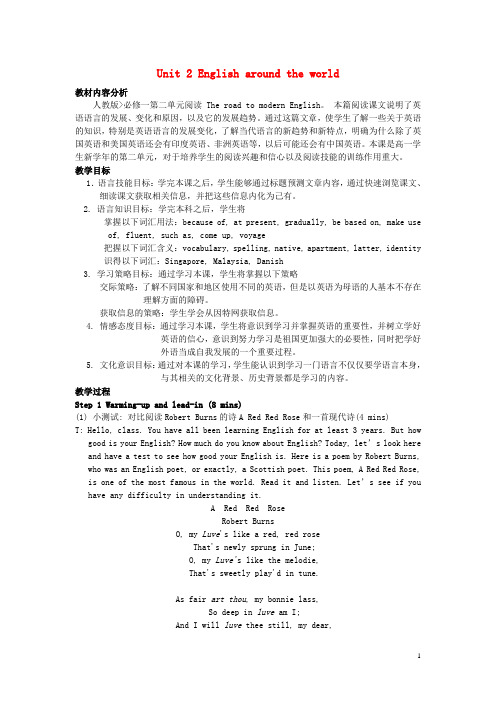
Unit 2 English around the world教材内容分析人教版>必修一第二单元阅读The road to modern English。
本篇阅读课文说明了英语语言的发展、变化和原因,以及它的发展趋势。
通过这篇文章,使学生了解一些关于英语的知识,特别是英语语言的发展变化,了解当代语言的新趋势和新特点,明确为什么除了英国英语和美国英语还会有印度英语、非洲英语等,以后可能还会有中国英语。
本课是高一学生新学年的第二单元,对于培养学生的阅读兴趣和信心以及阅读技能的训练作用重大。
教学目标1.语言技能目标:学完本课之后,学生能够通过标题预测文章内容,通过快速浏览课文、细读课文获取相关信息,并把这些信息内化为己有。
2. 语言知识目标:学完本科之后,学生将掌握以下词汇用法:because of, at present, gradually, be based on, make use of, fluent, such as, come up, voyage把握以下词汇含义:vocabulary, spelling, native, apartment, latter, identity 识得以下词汇:Singapore, Malaysia, Danish3. 学习策略目标:通过学习本课,学生将掌握以下策略交际策略:了解不同国家和地区使用不同的英语,但是以英语为母语的人基本不存在理解方面的障碍。
获取信息的策略:学生学会从因特网获取信息。
4. 情感态度目标:通过学习本课,学生将意识到学习并掌握英语的重要性,并树立学好英语的信心,意识到努力学习是祖国更加强大的必要性,同时把学好外语当成自我发展的一个重要过程。
5. 文化意识目标:通过对本课的学习,学生能认识到学习一门语言不仅仅要学语言本身,与其相关的文化背景、历史背景都是学习的内容。
教学过程Step 1 Warming-up and lead-in (8 mins)(1) 小测试: 对比阅读Robert Burns的诗A Red Red Rose和一首现代诗(4 mins)T: Hello, class. You have all been learning English for at least 3 years. But how good is your English? How much do you know about English? Today, let’s look here and have a test to see how good your English is. Here is a poem by Robert Burns, who was an English poet, or exactly, a Scottish poet. This poem, A Red Red Rose, is one of the most famous in the world. Read it and listen. Let’s see if you have any difficulty in understanding it.A Red Red RoseRobert BurnsO, my Luve's like a red, red roseThat's newly sprung in June;O, my Luve's like the melodie,That's sweetly play'd in tune.As fair art thou, my bonnie lass,So deep in luve am I;And I will luve thee still, my dear,Till a' the seas gang dry.Till a' the seas gang dry, my dear,And the rocks melt wi' the sun;I will luve thee still, my dear,While the sands o' life shall run.And fare thee well, my only Luve!And fare thee well, a while!And I will come again, my Luve,Tho' it were ten thousand mile!T: Did you find it easy or difficult? What about this one? This poem was written by a modern writer.I Am Not YoursI am not yours, not lost in you,Not lost, although I long to beLost as a candle lit at noon,Lost as a snowflake in the sea.You love me, and I find you stillA spirit beautiful and bright,Yet I am I, who long to beLost as a light is lost in light.Oh plunge me deep in love—put outMy senses, leave me deaf and blind,Swept by the tempest of your love,A taper in a rushing wind.T: Why is the first poem difficult to understand while the second one not? (Mainly because of some of the words used in the first poem, which are not often used now. Robert Burns lived in the 18th century while the writer of the second poem is a modern poet.) So we can see people in the past used different words from what is used today.(2) 听一段一位学生和来自澳大利亚的外教的对话(4 mins)T: Now, when one day Qiu Zhensong met our foreign teacher Zak, who is from Australia, what happened? Let’s welcome Zak and Qiu Zhensong.(After the dialogue, the foreign teacher explained.) Did you understand our dialogue? (Ss: No.) What’s the difficulty? (Different words were used in Australia which you do not know in American or British English.) T: So from the two poems and the dialogue we can see people from different countries speak different English and people in different times also use different English. How did the difference come about?[意图说明] 引入话题:不同时代、不同国家所使用的英语有所不同。
人教版高中英语必修一 Unit2English around the world

人教版高中英语必修一Unit2English around theworld人教版高中英语必修一Unit2English around the world 的单词和词组练习一、基本词汇:n. :1) elevator 电梯2) gas气体;汽油;煤气;毒气3) apartment(美)公寓4) spelling拼写;拼法5) Singapore新加坡6) lorry(英)卡车7) lightning闪电8) cab出租车9) petrol(英)汽油10)voyage航行;航海11)vocabulary词汇;词汇量;词汇表12)identity本身;本体;身份13)Malaysia马来西亚;马来群岛14)accent口音;腔调;重音15)block街区;块;木块;石块adj. :1) latter较后的;后半的;(两者中)后者的2) African非洲的;非洲人的;非洲语言的3) southeastern东南方的4) Midwestern中西部;有中西部特征的5) eastern东部的;东方的6) northwestern西北方的n./v. :1)base以……为基础;基部;基地;基础2)mand命令;指令;掌握;命令;指挥;支配3)request请求;要求n./adj.:1)native本地人;本国人;本国的;本地的2)Danish丹麦语;丹麦的;丹麦人的;丹麦语的3)Spanish西班牙人;西班牙语;西班牙的;西班牙人的;西班牙语的adj/adv.1) straight直接;挺直;直的;笔直的;正直的二、重点词汇:1) use n&v. 用处;使用 usage n.用法;词语惯用法2) express v.表达 expression n.词语;表达;表情3) recognize v. 辨认出;承认 recognition n.认出;识别;承认4) actually adv. 实际上 actual adj.实际上的5) graadually adv. 逐渐地;逐步地 gradual adj.逐渐的;逐步的6) fulently adv. 流利地 fluency n.流利;流畅 fulent adj.流利的7) frequently adv. 常常;频繁地 frequent adj.频繁的;常见的8) office n. 办公室 official adj.官方的三、重点短语:1) because of… 由于;因为because of和 because的区别:beccause of(后接词组或单词)because (作连词,后跟句子)eg:He was late not only because of his illness but also because he missed the train.不仅因为他的病痛而且因为他误了火车他才迟到的。
高一英语必修一Unit 2课文翻译
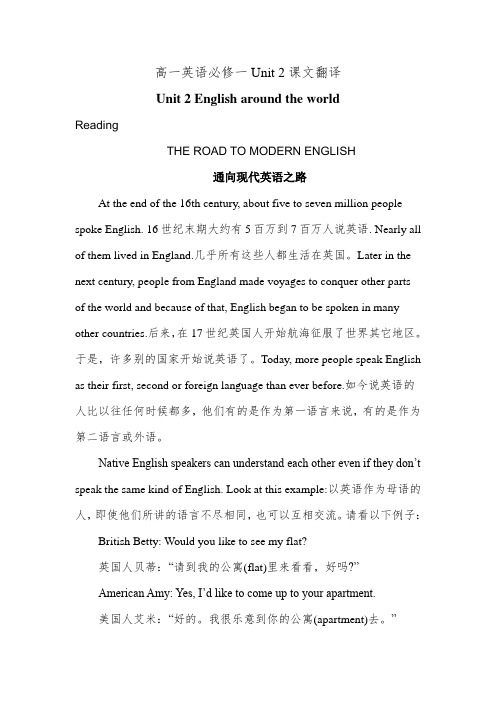
高一英语必修一Unit 2课文翻译Unit 2 English around the worldReadingTHE ROAD TO MODERN ENGLISH通向现代英语之路At the end of the 16th century, about five to seven million people spoke English. 16世纪末期大约有5百万到7百万人说英语. Nearly all of them lived in England.几乎所有这些人都生活在英国。
Later in the next century, people from England made voyages to conquer other partsof the world and because of that, English began to be spoken in many other countries.后来,在17世纪英国人开始航海征服了世界其它地区。
于是,许多别的国家开始说英语了。
Today, more people speak English as their first, second or foreign language than ever before.如今说英语的人比以往任何时候都多,他们有的是作为第一语言来说,有的是作为第二语言或外语。
Native English speakers can understand each other even if they don’t speak the same kind of English. Look at this example:以英语作为母语的人,即使他们所讲的语言不尽相同,也可以互相交流。
请看以下例子:British Betty: Would you like to see my flat?英国人贝蒂:“请到我的公寓(flat)里来看看,好吗?”American Amy: Yes, I’d like to come up to your apartment.美国人艾米:“好的。
高一英语必修一Unit2课文翻译

高一英语必修一Unit 2课文翻译Unit 2 English around the worldReadingTHE ROAD TO MODERN ENGLISH通向现代英语之路At the end of the 16th century, about five to seven million peoplespoke English. 16世纪末期大约有5百万到7百万人说英语. Nearly allof them lived in England.几乎所有这些人都生活在英国。
Later in thenext century, people from England made voyages to conquer other partsof the world and because of that, English began to be spoken in manyother countries.后来,在17世纪英国人开始航海征服了世界其它地区。
于是,许多别的国家开始说英语了。
Today, more people speak Englishas their first, second or foreign language than ever before.如今说英语的人比以往任何时候都多,他们有的是作为第一语言来说,有的是作为第二语言或外语。
Native English speakers can understand each other even if they don’t speak the same kind of English. Look at this example:以英语作为母语的人,即使他们所讲的语言不尽相同,也可以互相交流。
请看以下例子:British Betty: Would you like to see my flat?英国人贝蒂:“请到我的公寓(flat)里来看看,好吗?”American Amy: Yes, I’d like to come up to your apartment.美国人艾米:“好的。
人教版高一英语必修一《Unit 2 English around the world》评课稿
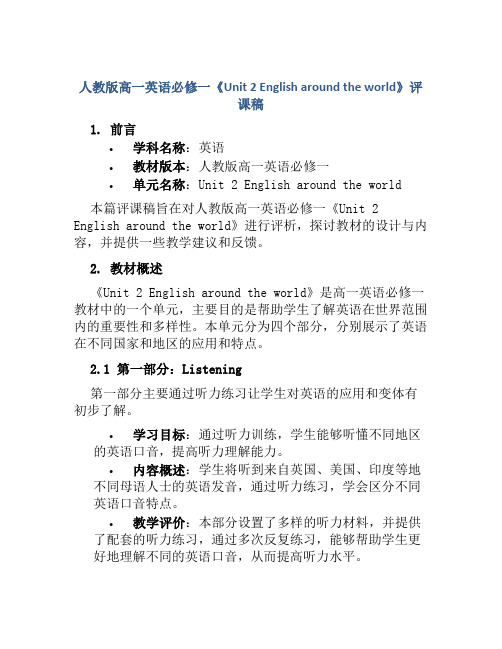
人教版高一英语必修一《Unit 2 English around the world》评课稿1. 前言•学科名称:英语•教材版本:人教版高一英语必修一•单元名称:Unit 2 English around the world 本篇评课稿旨在对人教版高一英语必修一《Unit 2 English around the world》进行评析,探讨教材的设计与内容,并提供一些教学建议和反馈。
2. 教材概述《Unit 2 English around the world》是高一英语必修一教材中的一个单元,主要目的是帮助学生了解英语在世界范围内的重要性和多样性。
本单元分为四个部分,分别展示了英语在不同国家和地区的应用和特点。
2.1 第一部分:Listening第一部分主要通过听力练习让学生对英语的应用和变体有初步了解。
•学习目标:通过听力训练,学生能够听懂不同地区的英语口音,提高听力理解能力。
•内容概述:学生将听到来自英国、美国、印度等地不同母语人士的英语发音,通过听力练习,学会区分不同英语口音特点。
•教学评价:本部分设置了多样的听力材料,并提供了配套的听力练习,通过多次反复练习,能够帮助学生更好地理解不同的英语口音,从而提高听力水平。
•建议与反馈:为了进一步提高学生的听力理解能力,可以增加一些真实英语对话的听力材料,并提供更多的听力练习题,引导学生进行听力训练。
2.2 第二部分:Speaking第二部分通过讲话和对话的练习,提高学生的口语表达能力以及交际能力。
•学习目标:通过课堂练习,学生能够模仿并正确运用英语口音和语调,并能够进行简单的英语对话和交流。
•内容概述:学生将练习模仿英美人士的英语发音,进行有关英语使用的对话练习,如问路、订购食物等场景。
•教学评价:本部分通过组织学生进行角色扮演和小组对话的方式,有效地锻炼了学生的口语表达能力,激发了学生的兴趣和参与度。
•建议与反馈:为了提高学生的口语表达水平,可以增加一些生活化实用的对话练习,如购物、旅行等场景,让学生更好地应用所学知识。
人教高中英语必修一unit-2-English-around-the-world-单词讲解

latest adj.最新的;最近的;最后的 lately(=recently) adv.最近;近来
选词填空(latter/later/late/lately/latest) ①Here are Tom and David; the _l_a_t_te_r__ is my
04 come up
come up①_上__来__,走__近_②__被__提_出____ ③__发_生__,__出__现___④__发__芽____
英译汉 (1)A foreigner came up to me and asked me the way to the railway station. 一个外国人走到我面前问我去火车站的路。 (2)The grass is just beginning to come up.
(1)vt. 以……为根据
base... on/upon 把……建立在……的基础上 be based on/upon 以……为基础/依据
(2)n.基部;基地;基础 at the base of 以……为基点;在……的底部
1.你不应该把自己的快乐建立在别人的痛苦之上。
You shouldn’t base your happiness on/upon the other’s sadness.
④The koala(考拉) is native ___to____Australia.
____考__拉__原___产__于__澳__大__利__亚__。________________________
请替换文字内容
点击添加相关标题文字,点击添加相关标题文字,点击添加相关标题 文字,点击添加相关标题文字,点击添加相关标题文字。
高中英语 必修1 (Unit2 English around the world the 5th period) 精品教案
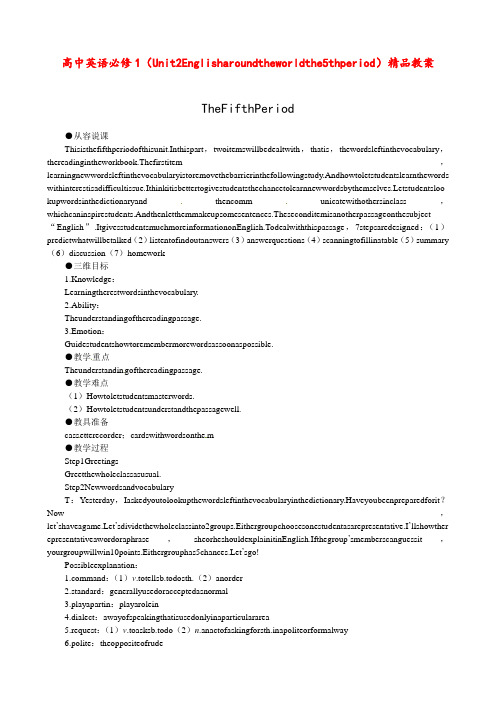
高中英语必修1(Unit2Englisharoundtheworldthe5thperiod)精品教案TheFifthPeriod●从容说课Thisisthefifthperiodofthisunit.Inthispart,twoitemswillbedealtwith,thatis,thewordsleftinthevocabulary,thereadingintheworkbook.Thefirstitem,learningnewwordsleftinthevocabularyistoremovethebarrierinthefollowingstudy.Andhowtoletstudentslearnthewords withinterestisadifficultissue.Ithinkitisbettertogivestudentsthechancetolearnnewwordsbythemselves.Letstudentsloo kupwordsinthedictionaryand thencomm unicatewithothersinclass,whichcaninspirestudents.Andthenletthemmakeupsomesentences.Theseconditemisanotherpassageonthesubject “English”.ItgivesstudentsmuchmoreinformationonEnglish.Todealwiththispassage,7stepsaredesigned:(1)predictwhatwillbetalked(2)listentofindoutanswers(3)answerquestions(4)scanningtofillinatable(5)summary (6)discussion(7)homework●三维目标1.Knowledge:Learningtherestwordsinthevocabulary.2.Ability:Theunderstandingofthereadingpassage.3.Emotion:Guidestudentshowtoremembermorewordsassoonaspossible.●教学重点Theunderstandin gofthereadingpassage.●教学难点(1)Howtoletstudentsmasterwords.(2)Howtoletstudentsunderstandthepassagewell.●教具准备cassetterecorder;cardswithwordsonthe m●教学过程Step1GreetingsGreetthewholeclassasusual.Step2NewwordsandvocabularyT:Yesterday,Iaskedyoutolookupthewordsleftinthevocabularyinthedictionary.Haveyoubeenpreparedforit?Now,let’shaveagame.Let’sdividethewholeclassinto2groups.Eithergroupchoosesonestudentasarepresentative.I’llshowther epresentativeawordoraphrase,sheorheshouldexplainitinEnglish.Ifthegroup’smemberscanguessit,yourgroupwillwin10points.Eithergrouphas5chances.Let’sgo!Possibleexplanation:mand:(1)v.totellsb.todosth.(2)anorder2.standard:generallyusedoracceptedasnormal3.playapartin:playarolein4.dialect:awayofspeakingthatisusedonlyinaparticulararea5.request:(1)v.toasksb.todo(2)n.anactofaskingforsth.inapoliteorformalway6.polite:theoppositeofrude7.retell:totellastoryagainorinadifferentform8.accent:awayofsayingwordsthatshowswhatcountry,esfrom9.recognize:toknowwhothepersonis10.eastern:inorfromtheeast ofacountryorplaceT:Welldone!Nowlet’sdealwiththesomeofthewordsandphrasesindeal.mandv.命令,指挥commandsb.todo;commandsth.;博得,应得commandthat-clausee.g.Hecommandedhismantoretreat.ThetroopswerecommandedbyGerneralHaig.Thekingcommandedthatshe(should)beexecuted.(建议,命令,要求一类词后从句中用虚拟语气,此类动词有suggest,advise,order,request,require,command,demand...)Hecommanded thebuilding(should)betorndown.n.命令[C];指挥,控制[U]e.g.Areyourefusingtoobeymycommands?Youmustobeyhiscommandthatthebuilding(should)betorndown.Takecommandof;beincommand;underone’scommand;underthecommandofsb.e.g.Shetookcommandofthisclassaftertheformermanagerleft.Shefeltincommandofherlife.ThebattleshipisunderthecommandofCaptainBlake.2.requestv.requeststh.(fromsb.);requestsb.todo;requestthat-clausee.g.Youcanrequestafreecopyoftheleaflet(宣传单).Youarerequestednottosmokeintherestaurant.Sherequestedthatnoone(should)betoldofherdecision untilthenextmeeting.n.request(forsth.);request(that)e.g.Requestsforvisaswillbedealtwithwithin48hours.Herrequestthatmoresweetsbeservedwasrefused.3.recognize辨认出;意识到;承认recognizesb./sth.(by/fromsth.)通过……认出……;recognizesth.(assth.);把……认作是……recognizethat意识到;承认e.g.Irecognizedthehousefromyourdescription.Drugswerenotrecognizedasaproblemthen.Nobodyrecognizedhowurgentthesituationwas.Werecognizedthatthetaskwasnoteasy.4.standardn.规格,标准[C&U]raise/improve/lowerstandard提高/降低标准set(sb.)astandard给某人定一个标准e.g.Hesethimselfsuchahighstandardthatheoftendisappointshimself.ofhigh/lowstandard具高/低标准的standards行为标准,道德标准amanofhighstandards一个道德高尚的人Step3ReadingT:WehavelearntEnglishformanyyears.Theninyouropinion,whatisaveryimportanthelptoyourEnglishstudy?S:teachers,books,tapes...T:Anythingelse?IsthereanythingthatyoucanturntoforhelpwhenyouareconfusedwhilelearningEnglish?S:Ithinkadictionaryisagreathelp.T:Yeah.Whenwemeetacrossnewwordsweoftenlookthemupinadictionary.Whatisthemostwidely-useddictionaryinChin ese?S:XinhuaDictionary.T:ThenwhichonedoyouthinkisusedwidelyinEnglish?S:I’msorryIhavenoidea.T:It’s LongmanDictionary andthe OxfordEnglishDictionary.Today,we’llreadapassageonthe OxfordEnglishDictionary.Nowaccordingtothetitle,whatdoyouthinkwillbementionedinthepassage?S:Ithinkthewriter,thetimewhenwasitwritten,whyitwaswritten,howitwaswritten,thefeatureofthedictionarywillbementioned.T:Now,let’slistentoittoseewhetheryouranswerisrigh t.(afterlistening)T:Doyouthinkthatyouranswerisright?S:Ithinkthatitdoesn’tmentionthefeatureofthedictionary.T:Yes.Nowlet’sreaditaloudtoanswerthesequestionsthen.①Whywasitwritten?②Whendiditstarttobewritten?③Whoisthewriter?④Howitwaswritten?S:①Toencourageeverybodytospellthesame.②Theideawasraisedin1857.And22yearsl ater,itbegantobewritten.③Threemenworkedtogetheronthedictionary:SamuelJohnson,NoahWebster,andJamesMurray.④Ittookthethreemennearlyalloftheirlivestotrytocollectwords.T:Goodjob!Thenwhofirstbegantoworkonthedictionary?S:Murray.T:Yes.Nowlet’sreadthelastparagraph.AndthenfinishthetableaboutnotesonJamesMurray’slifewithyourpartners.(checktogether)Step4Consolidation/discussionT:Afterreadingit,canyousaysomethingaboutMurray?Let’sdoachainreaction.EachstudentjustsaysonesentenceaboutMurray.T:Doyouthinkitworthsothesepeople’sspendingsomuchtimeon?Why?Nowdiscusswithyourpartnerandlistsomereasons.(discussforabout3minutes)Now,it’sshowtime.S:Wethinkthatitworththeirjob.Iftherewerenodictionaries,peoplewouldhavenoruletoguidethemwhileusingthelanguage,whichwillleadtoamessinEnglishbecausedifferentpeople wouldusedifferentlawstouseit.Thentherewillbemoredifficul tyinunderstandingoneanother.Withthedictionary,peoplehaveasetruletojudgewhethertheirwayofusingthelanguageisright.Step5SummaryandhomeworkToday,wehavelearnedthewordsleftinthevocabularyandwe’vegotsomeinformationonthelargeEnglishdictionary.Afterclass,pleasereadthewordsagainandagaintorecitethemandtrytousethemtomakeupsentences.●板书设计Unit2EnglisharoundtheworldTheFifthPeriodWordsmand2.request3.recognize4.standardUnderstandingofthepassageGuessingQuestions●活动与探究ThisresearchistodoresearchontheconceptoftheOxfordDictionaryandsomeotherkindsofdictionaryinEnglishspok encountries.SostudentsshouldworkingroupstostudytheitemsoftheOxfordDictionaryandfindoutthenamesofothertypenames Themostpopularone ThereasonAbout theOxfordEnglishDictionaryThe OxfordEnglishDictionary istheacceptedauthorityontheevolutionoftheEnglishlanguageoverthelastmillenniu m.Itisanunsurpassedguidetothemeaning,history,andpronunciationofoverhalfamillionwords,bothpresentandpast.Ittracestheusageofwordsthrough2.5millionquotationsfromawiderangeofinternationalEnglishlan guagesources,fromclassicliteratureandspecialistperiodicalstofilmscriptsandcookerybooks.The OED coverswordsfromacrosstheEnglish-speakingworld,fromNorthAmericatoSouthAfrica,fromAustraliaandNewZealandtotheCaribbean.Italsooffersthebestinetymologicalanalysisandinlistingofvariantspelli ngs,anditshowspronunciationusingtheInternationalPhoneticAlphabet.Asthe OED isahistoricaldictionary,itsentrystructureisverydifferentfromthatofadictionaryofcurrentEnglish,inwhichonlypresent-daysensesarecovered,andinwhichthemostcommonmeaningsorsensesaredescribedfirst.Foreachwordinthe OED,thevariousgroupingsofsensesaredealtwithinch ronologicalorderaccordingtothequotationevidence,i.e.thesenseswiththeearliestquotationsappearfirst,andthesenseswhichhavedev elopedmorerecentlyappearfurtherdowntheentry.Inacomplexentrywithmanystrands,thedevelopmentovertimecanbeseeninastructurewithseveral“branches”.TheSecondEditionofthe OED iscurrentlyavailableasa20-volumeprint edition,onCD-ROM,andnowalsoonline.Updatedquarterlywithatleast1000newandrevisedentries,OED Onlineoffersunparalleledaccesstothegreatestcontinuingworkofscholarshipthatthiscenturyhasproduced’(Newsweek).Tofindoutmoreaboutthe OED Online,whynotfollowourfree tour?“Aboutthe OxfordEnglishDictionary”invitesyoutoexploretheintriguingbackgroundanddistinctivecharacterofthe OED.Here,youwillfindin-deptharticlesaboutthehistoryofthe OED,aninsidelookattheprogrammesusedtoenlargeandupdatethe OED entries,little-knownfactsaboutitscontent,andmuchmore.。
人教新课标版高一必修1_Unit_2_English_Around_the_World-reading
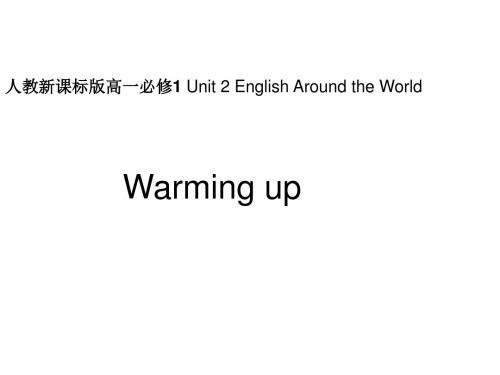
8. come up 上来, 走近; 被提出; (植物)发芽; (太 阳)升起 come up to sp 上某地来 come up with 提出 想出 He came up with a good idea in the meeting. 问题在会议中被提出来了。 •The problem came up in the meeting.
Find out the main idea for each paragraph
Time Between about ______ 1150 and AD450 _____
How is English developed?
England and based more on Spoken in ________ German _____.
语动词用单数。
More than one student wants to
go swimming.
高考链接
We advertised for pupils last autumn,
and got ___ 60. A. more than B. more of C. as much as D. so many as
1.Which of the following statement is true? A. Languages always stay the same B. Languages change only after wars
C. Languages no longer change
D. Languages change when cultures change
even if they don’t speak the same kind of English. adj. native land 祖国,故乡 native language 本族语言,母语 be native to The giant panda is native to Sichuan. n. 土著居民 study the habits of the natives even if= (even though) 尽管;即使 Even if the road is full of difficulty, I will never lose heart.
- 1、下载文档前请自行甄别文档内容的完整性,平台不提供额外的编辑、内容补充、找答案等附加服务。
- 2、"仅部分预览"的文档,不可在线预览部分如存在完整性等问题,可反馈申请退款(可完整预览的文档不适用该条件!)。
- 3、如文档侵犯您的权益,请联系客服反馈,我们会尽快为您处理(人工客服工作时间:9:00-18:30)。
The Third Period●从容说课This is the third period of the unit.The lesson deals mainly with the grammar,that is,the structure which expresses commands and requests and the reversal of the indirect speech and direct speech.The second part of this period is another passage “Standard English And Dialects”.After it,there is an exercise for us to make up dialogues using the commands and requests.This part is to give students a chance to practice this kind of structure.The second part of this period is another passage “Standard English And Dialects”.In this lesson we first review the grammar we learn in last unit.So students will be asked to do some exercises about this grammar item.By doing so,students can recall some rules of the reversal between the direct speech and indirect speech.Then,students will have a task to tell the requests from commands.Then show the sentence patterns of requests and ing is the aim of the language teaching,so after learning the structures,the most important one is to put them into use.After doing some exercises about reversal of direct speech and indirect speech,students will use these sentence patterns in daily life by making up dialogues according to the sit uation on Page 13.To make the students master the structure well,I think it is necessary to offer more practice.And the passage in this part is to provide students with more information on English and improve students’ reading speed.So I think it is not necessary to treat it as an intensive reading material according to the aim.Instead,I will teach it as an extensive reading passage.●三维目标1.Knowledge:Learn and master the sentence patterns which express an order and a request,and their different features.2.Ability:Use these patterns to communicate with others.3.Emotion:Help students master the points in this period.●教学重点Point out the features of an order—which uses the imperative,namely “tell/order sb. to do sth.”and a request—which uses a question form or an imperative,very polite,namely “ask sb. to do sth.”●教学难点How to change orders and requests into reported orders and requests.●教具准备slides●教学过程Step 1 Greetings and revisionGreet the whole class as usual.Review the useful words and expressions by letting students make up sentences using these words a nd expressions.Step 2 GrammarT:In the last unit,we have learnt something about the direct speech a nd indirect speech.We know while we change direct speech into indirect speech,we should change many things such as the tense,some adverbials and some verbs.Now let’s first do some exercises.Turn the following into Indirect Speech1.“I broke your CD player,”he said to me.2.“Are you sure you didn’t do anything to this?”he asked me.3.“A friend in need is a friend indeed,”Mother said to me.4.Tom said,“I bought a book for my brother yesterday.”5.He said,“I shall meet her at my office.”6.The teacher said,“I must go now.”7.He said,“I can do homework myself now.”8.He said,“The house was built in 1965.”9.“Why was Jenny late for school?”Mr Baker wanted to know.10.They said,“will you visit the museum tomorrow?”Turn the following into Direct Speech.11.I said that I would try my best.12.He wondered (asked)how long it took to do the work.13.Bob asked John whether he had seen his wallet.14.His aunt said that she had got there five days before.15.I asked Tom why he had not told her the truth.Suggested answers:1.He told me that he had broken my CD player.2.He asked me if I was sure I hadn’t done anything to that.3.Mother told me that a friend in need is a friend indeed.4.Tom said that he had bought a book for his brother the day before.5.He said that he would meet her at his office.6.The teacher said he had to go/must go then.7.He said that he could do homework himself then.8.He said that the house was built in 1965.9.Mr Baker wanted to know why Jenny had been late for school.10.They asked if we would visit the museum the next day.11.I said,“I’ll try my best.”12.He asked,“How long does it take to do the work?”13.Bob asked John,“Have you seen my wallet?”14.His aunt said,“I got here five days ago.”15.“Why didn’t you tell her the truth?”I asked Tom.T:You did a very good job.Today,we’ll go on to study indirect and direct speech.But firstly,we should learn to tell requests from commands.In English,giving commands is less polite than making a request.So most of time,commands are made by those people who are bosses,teachers,leaders,officers,or some other one who has authority.Now would you please tell which of them are commands?(show them a slide)1.Close the door!2.Would you please help me carry the case?3.Get me something to drink.4.Could you lend me 100 yuan?5.Please turn off the lights.6.Don’t smoke here.7.Will you clean the blackboard?8.Clean the table please.S:1,3,6 are commands,and others are requests.T:That’s right.So we can draw a conclusion:Sentence pattern for commands:Do.../Do not do...Sentence pattern for requests:Do...please./Can you do...?/Could you do...?/Will you do...?/Would you do...?Then if we want to change them into indirect speech,we should do like this:Commands:sb. told/ordered sb. (not)to do sth.Requests:sb. asked sb. else (not)to do sth.According to these rules,let’s do some practice.1.Change these sentences into Indirect Speech.He said to me,“Don’t smoke in this room.”He said to me,“Please don’t smoke in this room.”He said to me,“Could you please help me with my work?”Suggested answers:He told me not to smoke in that room.He asked me not to smoke in that room.He asked me to help him with his work.2.Change the following sentences into Direct Speech.The landlady asked him to put his coat in the closet.The young father told his children not to move.Mother told me to lock the door after midnight.Suggested answers:“Put your coat in the closet please,”the landlady said to him.The young father said to his children,“Don’t move.”Mother said,“Lock the door after midnight.”the teacher show the scree nCom e into/lab/without...T:Look at the screen.Let’s practise commands and requests in pairs.You may notice on the left,under the word “Don’ts”,there are three orders,under them there are three orders,under them there are three requests.On the right,under the word “Dos”,there are three orders,under them there are there requests.First we are going to practise the commands.I can give you anexample.Look at the six orders.In Direct Speech,I can say “Watch the teacher carefully.Don’t come into the lab without a teacher.”In reported order.I can say “She told us to watch the teacher carefully.She told us not to come into the lab without a teacher.”After you practise the orders,you may practise the requests.Are you clear?Now let’s begin.(give students several minutes to practise them,then teacher may check)Suggested answers:Direct Speech:1.Don’t come into the lab without a teacher.2.Don’t touch anything in the lab.3.Don’t smoke.4.Watch the teacher carefully.5.Dip your fingers into the mixture.6.Suck your fingers.7.Will you please not put anything in the basin?8.Don’t talk too loudly,please.9.Don’t leave the books in the lab,please.10.Write your answers on the blackboard,please.11.Could you please tidy the lab after the experiment?12.Put everything in the cupboards please.Indirect Speech:1.He told us not to come into the lab without a teacher.2.He told us not to touch anything in the lab.3.He told us not to smoke.4.He told us to watch the teacher carefully.5.He told us to dip our fingers into the mixture.6.He told us to suck our fingers.7.He asked us not to put anything in the basin.8.He asked us not to talk so loudly.9.He asked us not to leave the books in the lab.10.He asked us to write our answers on the blackboard.11.He asked us to tidy the lab after the experiment.12.He told us to put everything in the cupboards.4.Now let’s use these patterns to make up some dialogues.Please turn to the exercise on P13.Suggested dialogues:(1)A:Excuse me,could you please close the door?It’s so windy.B:Of course.(2)A:Excuse me,please make some room for me.I have to get off the train now.B:Sure.(3)A:Look out!A bear is approaching you!B:Help!I’m so scared!A:Don’t move!Keep calm.A bear won’t attack someone who is not to offend it.Step 3 ReadingT:As we all know,China is a very big country where different dialects are spoken.Can you list some of them?S:Guangdong dialect,Shanghai dialect,Sichuan dialect...T:Is there anybody who can speak a dialect from other place?S:(some students act it out)T:Thank you!Do you think that it is easy for people to follow those speaking different dialect?S:No.Some dialects are really difficult to understand.T:Then how can we solve this problem?S:We can communicate in Putonghua.T:Yes.The difference between Chinese dialects are so big that it’s really hard for people to communicate in it.So now most students are taught in school in Putonghua.Then do you think that it is the same case with the US?S:I think so.T:What is it that makes you think so?S:I think that the US is a big country just like China.Besides,it is a country in which many people are from different places.So I think that people may speak dialects.T:Let’s try to find it out whether it is the case.Now read it fast and then answer these questions.1.Is there the same case?Can you list some examples?2.Why are there so many dialects in the US?3.What is the standard English?4.Do you think there’s the standard English?5.Can you tell an interesting or funny story that shows great difference between dialects in Chinese?Suggested answers:1.Yes.It has many dialects,such as Midwestern,southern,African American and Spanish dialects.2.Because people have come from all over the world.Geography also plays a part in making dialects.3.It is believed to be the English spoken on TV and the radio.4.No.5.Keys or Kiss?One friend of mine was giving an English lesson to a class of adults who had recently come to live in the United States.Af ter placing quite a number of everyday objects on a table he asked various members of the class to give him the ruler,the book,the pen and so on.The class went very smoothly,and the students seemed interested and serious about the work that they were engaged in until my friend turned to an Italian and said,“Give me the keys.”The man looked surprised and somewhat at a loss(有点手足无措).Seeing this,my friend thought that the student hadn’t heard him clearly,so he repeated,“Give me the keys.”The Italian shrugged his shoulders.Then,he threw his arms around the teacher’s neck and kissed him on both cheeks.Step 4 SummaryT:Today we have learnt some patterns which express commands or requests.And we have dealt with the reversal of the sentence patterns.After reading the passage,we have known that American English has different dialects.Though there is no standard English,we should learn topronounce the English words correctly.Step 5 HomeworkT:Today’s homework is to recite words and phrases and make a dialogue using sentence patterns of expressing commands and requests.●板书设计Unit 2 English around the world●活动与探究1.One aim of this activity is to give students a chance to practice the sentence patterns in practice.So students are requested to make a research of the situations in which requests and commands are used.The other aim is to make research on dialects in China.They are asked to look into which dialect is the most popular in China and what causes this situation.2.将下列对话改成间接引语The following dialogue is an excerpt from Mark Twain’s The Million-Pound Bank Note.Henry found that there was a million-pound note in the envelope.He thought the two brothers had made a mistake.He hurried to their house and rang the bell.The servant appeared.Henry asked for the brothers.Servant:They are gone.Henry:Where?Servant:To the Continent.Henry:The Continent?Servant:Yes,sir.Henry:When will they be back?Servant:In a month,they said.Henry:A month!Tell me how to get word to them.It’s of great importance.Servant:I can’t,indeed.I’ve no idea where they’ve gone.Henry:Then I must see some member of the family.Servant:Family is away,too—in Egypt and India,I think.Henry:There’s been an immense mistake made.They’ll be back before night.Tell them I’ve been here,and that I’ll keep coming till it’s all right,and they needn’t worry.Servant:I’ll tell them,if they come back,but I’m not expecting them.They said you’d be here in an hour to make inquiries,but I must tell you it’s all right,they’ll be here on time to meet you.●备课资料English Teaching in the USAThe United States of America is mainly an English-speaking country.The majority of the population speak English as their native language.Business,education,social activities,etc.areconducted in English.Across the country,people pronounce many English words in several different ways,but for the most part,Americans speak one common language.This language is sometimes called American English.However not everyone in the U.S.A. is a native speaker of English.Most immigrants(移民)are speakers of other languages.There are hundreds of communities(社区)around the U.S.A.where English is not the most commonly used language.Chinese,Italian,German,Greek,Spanish,and French are all spoken in various communities in the U.S.Spanish is the second most commonly spoken language after English.It is widely spoken in New York and across the southern part of the country.For speakers of other languages,learning English is important,but teaching people to speak English as a second language was given little attention.Non-English speakers were expected to “pick up”the language by meeting with others in public.Recently,this has changed.Today,most large public schools and community colleges have ESL(English as a Second Language)programs:American English teachers feel that English students should learn the language the way they will use it.Therefore,ESL programs offer different English lessons to different students.Some programs teach students to communicate in English in public.Other programs teach the kind of English people will need for their jobs.American ESL instructional methods do not lay emphasis(强调)on grammar or translation,but on the importance of communication.The goal is to get the English learners to learn by using the language.Multiple choices:1.People in the United States____________.A.are all native speakers of EnglishB.speak English in various waysC.all speak American EnglishD.are immigrants from English-speaking countries2.In the past the non-English immigrants____________.A.didn’t know how to learn EnglishB.found that English was not importantC.learned English through booksD.paid special attention to teaching English3.____________is the most widely used language except English in the U.S.A.ESLB.FrenchC.Spa nishD.Chinese4.The phrase “pick up”in the second paragraph means “____________”.A.try to masterB.repeat again and againC.go to school sometimesD.learn without studying or taking lessons5.ESL programs teach the students____________.A.only grammatical rules and idiomsB.to use English through practiceC.different languagesD.to learn English by translating their own native languages into EnglishAnswers:1.B 2.A 3.C 4.D 5.BWords and IdiomsTo break your neck 美国人在讲话和写文章的时候经常用一些和人体各部分有关系的成语或俗语。
